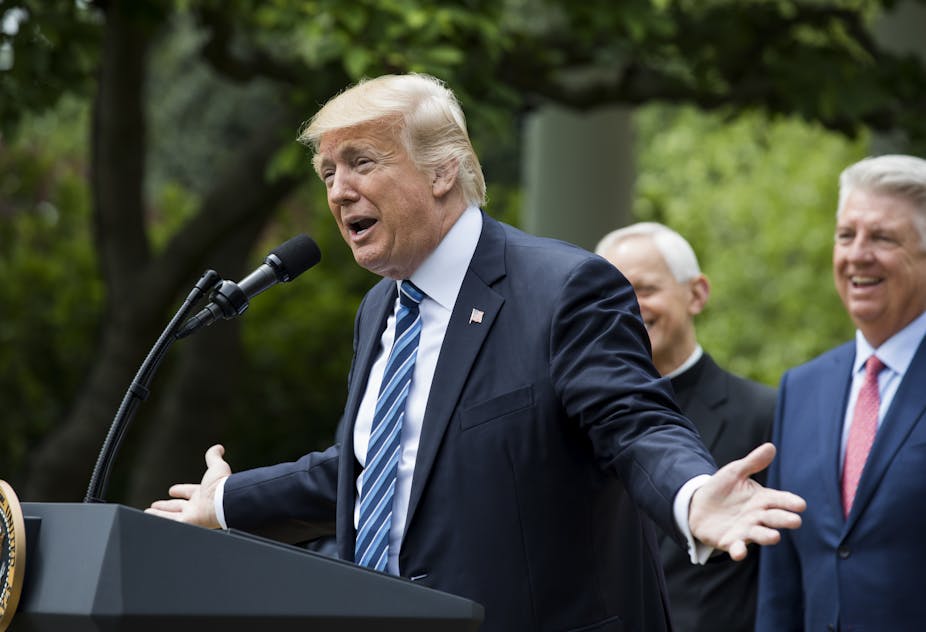Outraged Democrats are comparing Donald Trump’s sacking of FBI director James Comey with the Watergate misdeeds of Richard Nixon. Senator Bob Casey of Pennsylvania caught the mood by tweeting:
However, predictions that Trump will – like Nixon – become the author of his own downfall are unlikely to be fulfilled. Although no president has ever fired a FBI director engaged in investigating his own associates (in this case for possible interactions between his aides and Russia in the 2016 election), “Comeygate” is unlikely to have ramifications to match the Watergate scandal.
A brief recap of those events in the early 1970s shows us why. On the night of June 17 1972 operatives secretly connected with the Committee to Re-Elect the President (Nixon’s personal campaign organisation) were caught breaking into the Democratic National Committee headquarters at the Watergate office complex in Washington DC.
On June 23, Nixon and a top aide held their so-called “smoking gun” conversation in which they conspired to obstruct the FBI investigation into the burglars’ possible links to CREEP. While the issue soon disappeared from the headlines and did not hinder Nixon’s landslide re-election later that year, it resurfaced when the burglars came to court in early 1973.
The threat of heavy sentences prompted all but one of them to spill the beans. This led to the setting up of a bipartisan select committee on presidential campaign activities, whose hearings between May and August became one of the television events of the decade.

White House aides subpoenaed to testify began to reveal the truth of election dirty tricks. But none implicated Nixon until presidential counsel John Dean, the man who effectively ran the Watergate cover-up, laid bare the president’s culpability. Then, on July 16, former Nixon aide Alexander Butterfield revealed the existence of a secret taping system that recorded presidential Oval Office conversations.
In the meantime, the Nixon administration had bowed to congressional pressure to appoint high-profile lawyer Archibald Cox as an independent special prosecutor. Cox made it his mission to secure release of the secret tapes, fighting Nixon’s attempts to block this on the grounds of national security.
His persistence eventually provoked Nixon into sacking him. But this was a huge political error. Until this point the public had been broadly supportive of the president. Now they became convinced he had something to hide. A chastened Nixon had to appoint a new special prosecutor, Leon Jaworski, who pursued him through the courts and successfully gained access to the tapes.
The writing was now on the wall for Nixon. The House of Representatives was in the process of drawing up articles of impeachment – and the taped revelation of his obstruction of justice ensured their approval by the Senate. Once Nixon discovered that not enough Republican senators would stick by him, making impeachment by a majority inevitable, he resigned the presidency on August 9 1974.
Trumped up charges?
He would have faced criminal prosecution out of office had his successor, Gerald Ford, not pardoned him for unspecified crimes he may have committed. Ford was trying to spare the nation the trauma of a presidential trial, but his clemency enabled Nixon to claim for the rest of his life that he had never been proven guilty of any wrongdoing.

There are several reasons why Trump looks unlikely to suffer the same fate as Nixon. Firstly, and most importantly, he has the advantage of a Republican Congress. His fellow party members will not want a politically risky investigation into Trump’s reasons for sacking Comey. Plus, Senate Republicans are likely to approve whoever Trump chooses to run the FBI.
There is also little prospect of Republican congressional leaders yielding to demands for a Watergate-style select committee to investigate 2016 campaign activities.
Secondly, Trump’s popularity is already at a low ebb. He has the lowest average approval rating (41%) of any president for his first 100 days in office and his core supporters will not desert him over the Comey sacking. Nixon, by contrast, had a very long way to fall after winning such a massive re-election in 1972.
Thirdly, no “smoking gun” has been turned up to date – and there is no whistle blower on the horizon.
But Trump is not fully out of the woods. It is not just Democrats who are appalled by his firing of Comey. High-profile Republicans are angry too. And questions over his connections to Russia will not just disappear, so he should not get overconfident in the way that Nixon did. Trump’s knowledge of American history has been questioned only recently. Perhaps he should brush up on Nixon’s mistakes in order to avoid repeating them.

